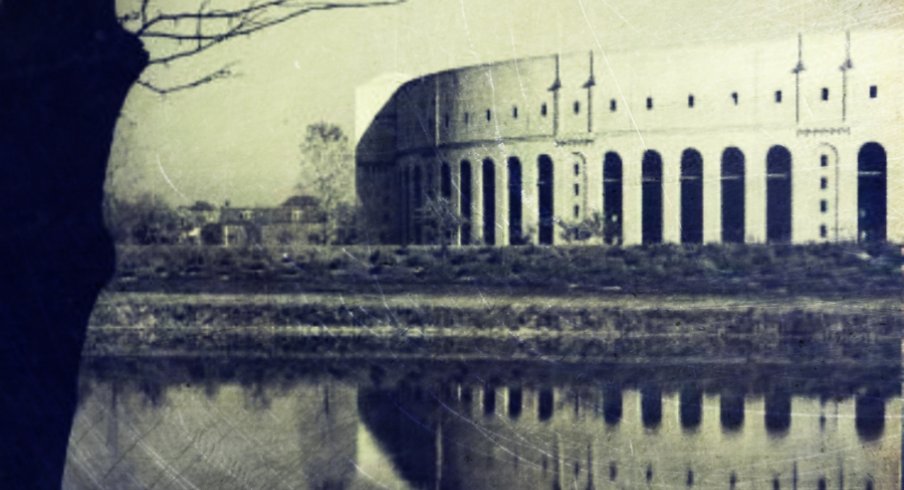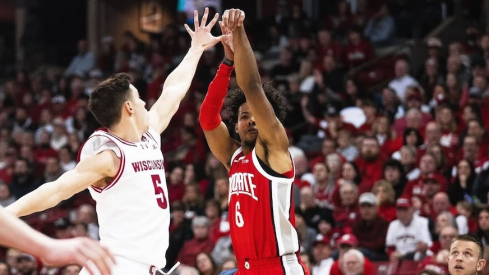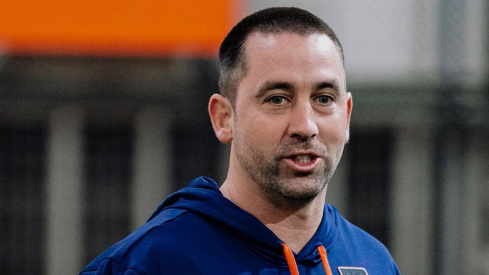"We're on the banks of the Olentangy River in Columbus, Ohio."
That phrase hits your brain with a unique cadence. You may have said or thought these words while describing Ohio Stadium, either in passing or while cracking your first tailgating beer on a brisk October morning. Perhaps you even changed the inflection of your voice to make it little folksier than usual. Onnnn the bankkkksss of the OLEN-TAN-GEE.

The river that cuts through the Capitol is nearly 100 miles long, yet those words in succession refer to a precise location. The university did not originally publicize that descriptor, however ubiquitous it may be now. People who live among stoplights don't use river banks to describe geography. They use streets. For 60 years the Horseshoe was on Stadium Drive. Since 1982, it's been Woody Hayes Drive.
But the main reason you, me and everyone else uses its proximity to water is that a man on television did so to open his monologue, by describing the natural setting of the football game he was about to share with his audience.
We're on the banks of the Olentangy River in Columbus, Ohio. Those are Keith Jackson's words. Whenever we say them - either while driving past it on 315 or while chewing up a pregame libation nearby - we are parroting him. He singlehandedly changed the way we describe the stadium. He even altered the complexion of the river that runs alongside it.
Back when Jackson first invoked the banks of the Olentangy nobody in their right mind would have dipped a toe in it, even on a dare with money involved. It was disgusting to the point of being toxic. But as his buoyant voice described it, the warm sun shined above Jackson's river, despite any clouds in the game day forecast. The fish in it had only two eyes, and no legs.
He explicitly said none of this. That was the most underappreciated element of his broadcasting, despite the eulogies that have poured out since his passing last week, which have focused more on his quips. What Jackson did not say colored in the picture just fine, similar to the way reading leaves more to your imagination than being spoonfed every single detail.
Consider his call of what is arguably college football's most famous play, which came at Michigan's expense. Listen to how little he says as the impossible takes place:
The score and the names involved receive passing mentions. Conference standings and statistics - unimportant details in the face of what's just happened. Jackson viewed the game from far above the fray, rather than behind several monitors with producer commentary being barked into his ear.
He didn't fill every moment with media guide tidbits or the persistent sound of his own shouting. Instead of cheap noise, he paused and allowed the moment to breathe. And then, a eulogy:
There are no flags on the field. Only despair for the Maize and Blue.
Jackson was a steward of the joy and the pain that balances each sporting event. Broadcasters are routinely accused of carrying a bias for or against a particular team. He merely dispensed the equilibrium. Jackson was the game's minimalist, which was all that his storytelling required.
Keith Jackson didn't OVERfill every moment of a game with media guide tidbits or the sound of his own voice. HE SPOKE WHEN THE BROADCAST REQUIRED IT.
He frequently described the U-shaped building next to the Olentangy as one of college football's cathedrals. Its beds and banks were, by their proximity, sacred ground. For one minute prior to each broadcast, he would capture the majesty of a College Football Saturday as a religious experience; a rare service that occurs only a dozen times each year.
Those upgrades did not exclusively belong to Ohio, either. Jackson could make any cookie-cutter, objectively unremarkable college campus sound like the holy land only its alumni ever believed it to be. He made the opening broadcast soliloquy its own event, transforming any place or team into something far better than it was, which made any vested observer feel the same of themselves.
So when Jackson was tasked with describing a thing of real value - such as the greatest rivalry in the American sports - it sounded like this:
Had he been more disciplined with his career whims - Jackson first retired from broadcasting altogether in 1986 and then several more times after that - we would have been denied his best work. We would have missed his presence throughout 1998 (his third "final" season of broadcasting) as he was assigned to much of the preseason No.1's schedule; a team his employer had expected to appear in his last performance, the first-ever BCS Championship Game.
Jackson accompanied the Buckeyes for much of that ride. The team from Columbus didn't make it to the last stop. That was as unplanned as nearly all of his retirements.
His tribute to the Ohio State-Michigan rivalry at 100 would have also been left unsaid. Countless moments in college football history would have been shaped differently. Somebody else would have called the Buckeyes' national title victory in Tempe against the Miami Hurricanes.
And all of us would be referring to Ohio Stadium as a place on Woody Hayes Drive.



